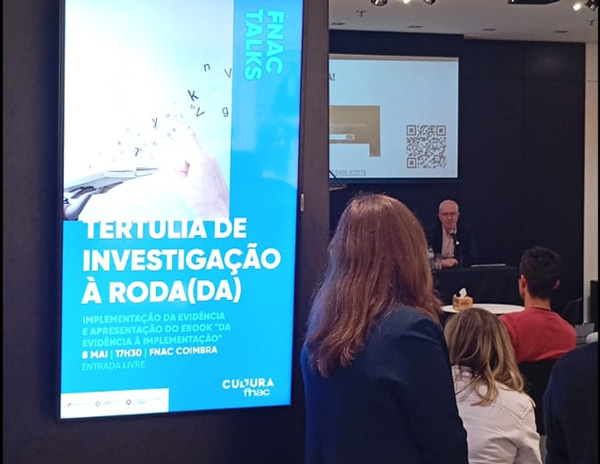Sharing Research: a collaborative knowledge communication
Authors: António Manuel Marques, Cármen Nogueira, Diana Santos, Liliana Escada Ribeiro and Maria do Céu Nunes
JBI Portugal Centre for Evidence-Based Practice, Unidade Local de Saúde de Coimbra, Coimbra, Portugal
Introduction
Research is essential to improve the quality of healthcare. It helps to ensure that practices are safe, effective and efficient, and centred on people and their families. However, scientific knowledge is often shared in ways that are insufficient, complex and inaccessible. At the same time, the overwhelming volume of research produced everyday makes it challenging for both professionals and the general public to keep up. Added to this is the challenge of how knowledge is interpreted and used. Together, these barriers – the volume of research, the complexity of how it is communicated and the way knowledge is appropriated – mean that valuable knowledge often fails to reach practice or the public.

The problem
Problem 1: Volume of research
Healthcare professionals face an unmanageable flood of new evidence every day. This is impossible to keep up with and even harder to apply in daily practice.
Problem 2: Complexity of research communication and the appropriation of knowledge
Research is often shared in technical, inaccessible ways. This excludes both healthcare professionals and citizens, preventing them from engaging and making informed decisions.
The NIE’s role
This is where the Nursing Research Group (Núcleo de Investigação em Enfermagem [NIE]) of the Unidade Local de Saúde de Coimbra (ULSC), Portugal – a research unit of the Health Sciences Research Unit: Nursing (UICISA: E) – plays a crucial role. This is because collaborative communication of this knowledge can make a real difference. We want knowledge to be shared in a simple and accessible way, so that everyone can benefit from it.
One of the NIE’s main goals is to produce and share knowledge. To this end, we identify priority areas for nursing research, support nursing teams in developing and implementing their projects and disseminate the results clearly and practically.
We do this by involving nurses and citizens, because we believe that accessible and shared knowledge has the power to transform the quality of care.
This is one of our commitments, both inside and outside the hospital: to promote collaborative communication of nursing research results, sharing them not only with the scientific community but also with a wider public. We do this through ‘Sharing Research’ nursing meetings, research gatherings in the community, symposiums, the publication of books and scientific articles and through social media.
The search for answers
To communicate knowledge collaboratively, we have been developing a series of synergistic initiatives that value different forms of knowledge and allow everyone to take part in building an evidence-based culture of care. We highlight:
- ‘Sharing Research’ nursing meetings: These are held every two months in the hospital. The meetings encourage the sharing of new knowledge that can be applied directly to clinical practice.
- ‘Around the Table’ research gatherings: We leave the formality of classrooms and lecture halls behind and bring research to informal spaces, such as a historic café in the heart of Coimbra or the FNAC bookshop, as if it were a gathering of friends around a table. The aim is to bring research closer and make it more accessible to the general public. Here, we talk about nursing research using simple, everyday language, creating an environment where anyone can listen, ask questions and join the conversation. These gatherings have helped to bridge the gap between nurses and the public. People often share their own experiences, ask questions and propose ideas for future research topics.
- Nursing research symposiums: This is a biennial event where we give stage to experts in advanced areas of knowledge, showcase research innovations and debate and reflect on issues related to communicating science to the public. These events create a strong network for sharing, involving professionals, researchers, students and patients. At these events, we have set up discussion tables where researchers, teachers, nurses and patients can sit together.
- Publication of the book, From evidence to implementation: This is a tool to support evidence-based practice, providing a practical resource for healthcare professionals. The book brings together, for the first time in Portugal, 17 cases of evidence implementation conducted by ULSC nurses. It shares the challenges, strategies and opportunities for implementing evidence-based practices, as well as their real impact on improving the quality of care. This promotes a greater interest in evidence implementation at ULSC.
- Publication of the book, Science and reflections on care in the COVID-19 pandemic: Published in collaboration with UICISA: E, this book brings together several studies and testimonies that highlight the experiences of healthcare professionals, patients and families during the pandemic.
- Publication of more than 20 scientific articles in journals, resulting from research carried out at ULSC over the last six years.
- Spreading our work: In addition to the hospital’s internal website, we also use the ULSC Nursing News publication to share our events and activities. Externally, we focus mainly on dissemination through social media, particularly Facebook, to reach a wider audience and promote interaction. These platforms allow us to share nursing research, encourage feedback and make scientific knowledge part of everyday life.

Result/outcome
Through these initiatives, we aim to make scientific evidence more accessible to professionals and the general public alike. Collaborative communication creates the opportunity to exchange information, ideas and experiences, promoting informed decision-making, problem solving and innovation in healthcare.
With the ‘Sharing Research’ Nursing Meetings, we provide a space for sharing studies and knowledge that might otherwise go unnoticed. The ‘Around the Table’ Research Gatherings have also sparked curiosity among the public who, in some cases, heard about nursing research for the very first time in an informal and demystified way. The book, From evidence to implementation, has become a landmark in the way we communicate knowledge, turning evidence into a resource accessible to all healthcare professionals. Spreading our work through social media allowed us to communicate knowledge not only to colleagues but also to a wider community.
Challenges and lessons learned
One of our main challenges is to continue increasing the number of research projects that produce new knowledge and respond to emerging challenges in clinical practice. Another challenge is to increase the number of evidence implementation projects, as we already have strong evidence of their impact in improving the quality of care – both in terms of improving compliance with the best practices and in terms of their impact in patient health. Finally, we intend to build international partnerships for these projects, so that we can learn from other experiences and increase the impact of our research.
The main obstacles we face are related to structural and organisational limitations, which make it difficult to produce and disseminate knowledge. In addition, the limited time available for discussion during events and training sessions limits the opportunities for sharing and reflection, which are essential for strengthening collaborative communication knowledge.
Next steps
At NIE, we are committed to continuing our mission of making knowledge more accessible. One of our next steps is to involve primary healthcare, building bridges between different levels of care so that knowledge can develop, become more accessible and reach more people.
We also want to explore new ways of communicating knowledge, making science communication simple and more appealing. At the same time, we want to strengthen our digital presence, taking greater advantage of the potential of social media to reach more diverse audiences, including professionals from other institutions and a wider community.
Key take-home messages
- Collaborative communication brings knowledge closer to people and practice.
- Knowledge is collective: no one has all the answers, but everyone has something valuable to contribute.
- NIE has demonstrated that using different formats and spaces for knowledge communication can increase the accessibility of science for all.
References
Braithwaite, J., Glasziou, P., & Westbrook, J. (2020). The three numbers you need to know about healthcare: The 60-30-10 challenge. BMC Medicine, 18, 102. https://doi.org/10.1186/s12916-020-01563-4.
Links to additional resources
https://www.facebook.com/people/N%C3%BAcleo-de-Investiga%C3%A7%C3%A3o-em-Enfermagem-ULS-Coimbra/100057173421425/#
http://hdl.handle.net/10400.4/2379
https://www.esenfc.pt/pt/download/86007/u1Pyl7ysXgY8pm914sk6
Neves, T. M. A., & Marques, A. M. (2023). Self-management plan of chronic disease among inpatients admitted to a Portuguese endocrinology unit: A best practice implementation project. JBI Evidence Implementation, 21(2), 178–185. https://doi.org/10.1097/XEB.0000000000000320
Nunes, M., Gonçalves, M. A., Vidinha, T., & Santos, E. (2022). El juicio clínico de las enfermeras sobre el empoderamiento del cuidador. Index de Enfermería, 31(3), e14092. https://ciberindex.com/index.php/ie/article/view/e14092
Escada Ribeiro, L., Nogueira, C., Antunes, M., Marques, A., & Ferreira, R. (2025). Peer support interaction in people with chronic diseases: Nurses’ perspectives and practices. Millenium - Journal of Education, Technologies and Health, 2(16e), e36074. https://doi.org/10.29352/mill0216e.36074
Nunes, M. do C., Lopes, M. B., Manata, J., Santos, D., Limão, R., & Santos, E. (2024). Requisitos para a assunção do papel de prestador de cuidados: A perceção dos enfermeiros. Millenium - Journal of Education, Technologies and Health, 2(14). https://revistas.rcaap.pt/millenium/article/view/32918/24214
To link to this article - DOI: https://doi.org/10.70253/QRBG2973
Disclaimer
The views expressed in this World EBHC Day Blog, as well as any errors or omissions, are the sole responsibility of the author and do not represent the views of the World EBHC Day Steering Committee, Official Partners or Sponsors; nor does it imply endorsement by the aforementioned parties.

Core staff at the JBI Portugal Centre for Evidence-Base. Coordinator of the Nursing Research Group and Nurse Supervisor at ULSC.
Former Director of Nursing. MSc in Health Economics and Management.